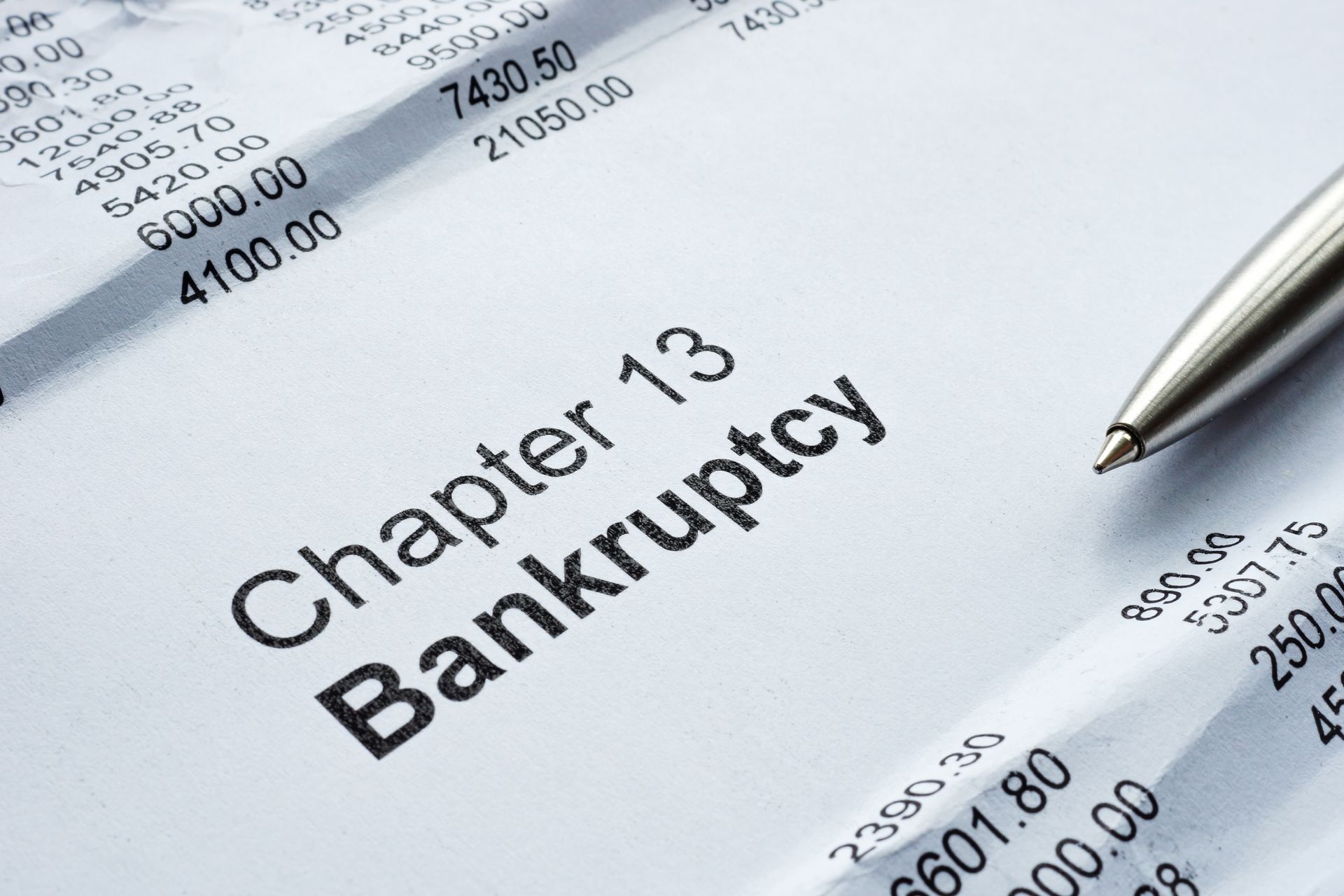Chapter 11 Bankruptcy: A Lifeline for Struggling Businesses
The Importance of a Chapter 11 Lawyer

Chapter 11 bankruptcy—often called "reorganization" bankruptcy—is a legal process designed to help businesses in financial distress restructure their debts while continuing their operations. This type of bankruptcy is particularly crucial for companies facing insolvency but needing to preserve their business assets, manage their debt obligations, and maintain their workforce.
Unlike Chapter 7 bankruptcy, which involves liquidating assets to pay off creditors, Chapter 11 allows a business to reorganize its financial framework under court supervision. This process enables the business to propose a plan to restructure its debts, including renegotiating terms with creditors, selling off some assets to pay debts, or downsizing operations to reduce expenses. The goal is to adjust the company's debt load to a more manageable level while keeping the business alive and operational.
Chapter 11 is significant because it can preserve a company and protect all parties involved, including creditors, suppliers, and employees. For businesses with a viable underlying business model but are currently overwhelmed by their financial obligations, Chapter 11 offers a vital second chance for recovery and eventual profitability.
Understanding Chapter 11 Bankruptcy: Definition, Differences, and Strategic Importance
What is Chapter 11 Bankruptcy?
Chapter 11 bankruptcy, formally known as a reorganization bankruptcy, is primarily intended for reorganizing a business, which can be a corporation, sole proprietorship, or partnership. It provides a legal framework where a financially distressed business can restructure its debts while continuing its operations. The business, often referred to as the "debtor in possession," maintains control over its assets and operates under the oversight of the bankruptcy court.
Key Differences Between Chapter 11, Chapter 7, and Chapter 13 Bankruptcy
- Chapter 7 Bankruptcy: Known as liquidation bankruptcy, Chapter 7 is designed for individuals and businesses that cannot reasonably repay their debts. In this process, a trustee is appointed to liquidate the debtor's non-exempt assets to pay creditors. Businesses generally cease operations if they undergo Chapter 7.
- Chapter 13 Bankruptcy: This type is exclusively for individuals (including sole proprietors) and involves reorganizing debts and creating a plan to repay creditors over three to five years. Unlike Chapter 7, which may require asset liquidation, Chapter 13 allows individuals to keep their property and avoid foreclosure.
- Chapter 11 Bankruptcy: Unlike Chapter 7, Chapter 11 allows businesses to continue operations, and, unlike Chapter 13, it is available to both individuals and businesses regardless of the size of their debts. Due to its procedural intricacies and the required oversight, Chapter 11 is more complex and typically more expensive.
Importance of Choosing the Right Type of Bankruptcy for a Business
Selecting the appropriate type of bankruptcy is crucial for a business's future. The choice depends on several factors, including the business's financial situation, goals for the future, and whether the business intends to continue operations.
- Continuing Business Operations: Chapter 11 is generally preferable for businesses that wish to continue operating while restructuring their debts. This option helps preserve jobs and potentially returns the business to profitability.
- Liquidation: If a business has no viable future, Chapter 7 might be more suitable as it allows for a clean and final resolution to its debts through liquidation.
- Debt Limits and Repayment Ability: Chapter 13 might be an option for sole proprietors if their debt levels fall within certain limits and they have sufficient income to meet the repayment plan.
Choosing the correct type of bankruptcy can impact a business's ability to recover or transition smoothly post-bankruptcy. Legal advice is essential in this decision-making process to ensure that the chosen path aligns with the business's long-term strategy and immediate financial needs.
When to Consider Filing for Chapter 11 Bankruptcy
Signs That a Business Should Consider Filing for Chapter 11
Deciding to file for Chapter 11 bankruptcy is significant and typically comes after recognizing certain warning signs that indicate a business cannot sustain its current financial path. Key signs include:
- Persistent Cash Flow Issues: If a business consistently spends more than it earns, creating unsustainable cash flow deficits, it may need the breathing room provided by Chapter 11 to reorganize.
- Inability to Meet Debt Obligations: When a business struggles to pay debts as they come due, especially if these challenges are not temporary, Chapter 11 may offer a necessary restructuring platform.
- Overleveraged Assets: If debts far exceed the current value of the business's assets, Chapter 11 can help restructure these debts to more manageable levels without immediate liquidation.
- Legal or Trade Pressures: Facing litigation or losing critical vendors/suppliers because of unpaid bills can jeopardize an operation, making Chapter 11 a potential avenue for negotiation and settlement under court protection.
Financial Thresholds and Criteria for Chapter 11 Eligibility
Chapter 11 bankruptcy is accessible to businesses and individuals, including corporations, partnerships, and sole proprietors. Critical eligibility criteria include:
- No Specific Debt Limits: Unlike Chapter 13, Chapter 11 does not impose a ceiling on the amount of debt a debtor may have.
- Voluntary and Involuntary Cases: A business can voluntarily file for Chapter 11, or creditors can band together to file an involuntary petition against a business failing to pay its debts.
- Credit Counseling: Before filing, a business must undergo credit counseling from an approved agency within 180 days before the filing date, similar to other bankruptcy types.
Case Studies of Businesses That Benefited from Chapter 11
- General Motors (2009): GM filed for Chapter 11 as part of a strategic restructuring plan supported by the U.S. government. This allowed GM to reorganize $172 billion in debts and emerge leaner, with fewer brands and a stronger balance sheet.
- American Airlines (2011): Facing high labor costs and a struggling economy, American Airlines used Chapter 11 to restructure its debts and reduce its labor obligations, eventually merging with US Airways to strengthen its market position.
- Kodak (2012): Eastman Kodak filed for Chapter 11 to manage its overwhelming debt and shift its business focus from traditional photography to digital products and services. The restructuring allowed Kodak to emerge in 2013 as a technology company focused on imaging for businesses.
These examples illustrate how Chapter 11 bankruptcy isn't just a last resort; it's a strategic tool that can facilitate profound business transformation and renewal, allowing companies to realign their operations with current economic realities and market demands.
The Role of a Chapter 11 Lawyer: Expert Guidance Through Business Reorganization
What Does a Chapter 11 Lawyer Do?
A Chapter 11 lawyer specializes in bankruptcy cases, guiding businesses through the complex reorganization process under Chapter 11 bankruptcy laws. Their roles and responsibilities include:
- Filing Preparation: Assisting with all documentation and filings necessary to initiate the bankruptcy process, ensuring compliance with legal standards and timelines.
- Legal Representation: Acting as the primary legal representative in court, handling all proceedings, including the initial filing, creditor meetings, and confirmation hearings.
- Debt Restructuring Plan: Develop a viable reorganization plan that details how the business will handle its debts, continue operations, and eventually emerge from bankruptcy. This plan must be fair to creditors and feasible for the business, and it requires court approval.
- Negotiations with Creditors: Representing the business in negotiations with creditors to restructure debt terms. This may involve extending payment terms, reducing the interest rate, or converting debt into equity.
- Asset Management: Advising on managing and disposing of assets, ensuring that the business retains the necessary assets to continue operations and that asset sales are handled appropriately.
- Legal Advice and Strategic Planning: Providing ongoing legal advice to manage risks during bankruptcy, ensure compliance with new operational restrictions, and align business strategies with financial recovery.
Importance of Legal Advice During the Restructuring Process
Legal advice is crucial during the restructuring process for several reasons:
- Complex Legal Requirements: Chapter 11 contains complex legal requirements that can be difficult to navigate. A lawyer ensures that all legal filings are correct, timely, and in the business's best interest.
- Strategic Decision Making: A Chapter 11 lawyer provides strategic guidance on critical decisions, such as which debts to prioritize and which parts of the business may need to be downsized or shut down.
- Protection from Adverse Actions: During bankruptcy, businesses gain an automatic stay against most collection activities, lawsuits, and foreclosures. A lawyer helps enforce this stay, giving the business the needed respite to reorganize.
How a Lawyer Can Help Protect Assets and Negotiate with Creditors
Protecting assets and negotiating with creditors are two of the most critical aspects of a Chapter 11 case:
- Asset Protection: Chapter 11 lawyers work to protect a business's assets from unnecessary liquidation. They help identify exempt assets, negotiate leases and contracts, and propose reorganization plans that maximize asset retention.
- Creditor Negotiation: Lawyers play a crucial role in negotiating terms with creditors to ensure that debt repayments are structured in a way the business can manage. This might involve reducing the total debt burden, negotiating lower interest rates, or proposing equity exchanges.
The effectiveness of a Chapter 11 lawyer can significantly influence the outcome of a bankruptcy case, affecting whether a business can successfully reorganize and how quickly it can return to profitability. Thus, selecting a lawyer with specific experience in Chapter 11 cases is crucial for businesses considering this path.
Take the Next Step Towards Financial Recovery
Navigating the complexities of Chapter 11 bankruptcy requires a keen understanding of the law, strategic foresight, and expert guidance. Whether you are just beginning to consider the possibility of filing for Chapter 11 or you are ready to take the steps necessary for a reorganization, professional legal advice is indispensable.
Understanding the specifics of your situation is crucial to providing accurate legal advice. That's why we offer a no-obligation, free consultation to discuss your business's unique circumstances. This initial consultation will allow us to assess your financial situation, provide preliminary advice, and outline potential legal strategies that could guide your business back to profitability.
Don't navigate the challenges of Chapter 11 alone. Contact J. Singer Law Group today to schedule your free consultation. Our experienced bankruptcy lawyers are ready to assist you in making informed decisions that protect your interests and aim for a successful business restructuring.











